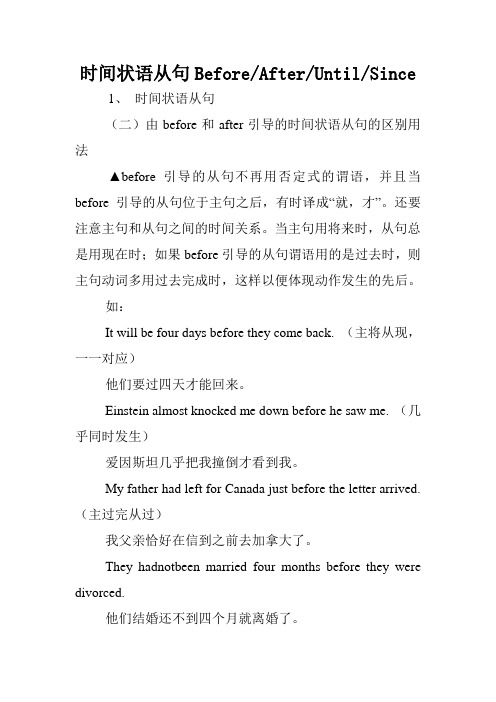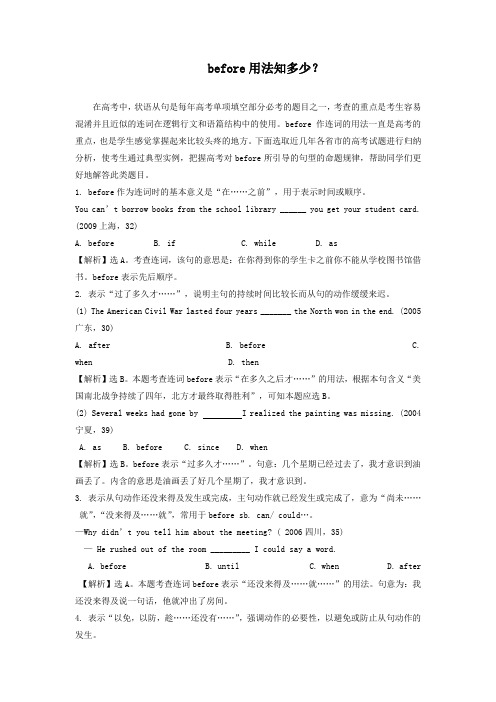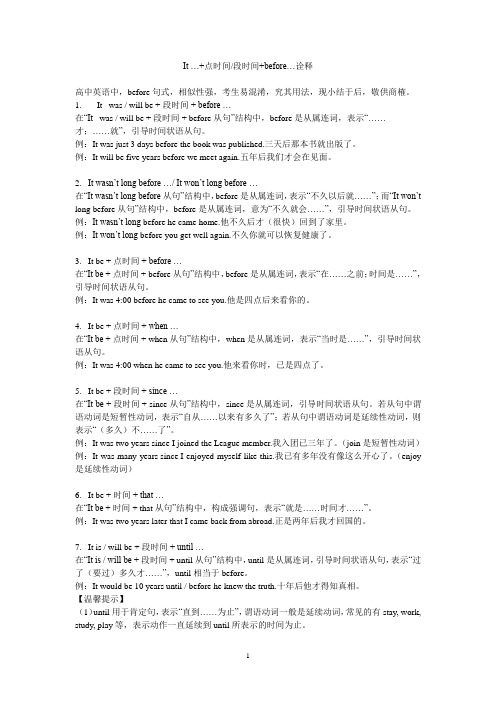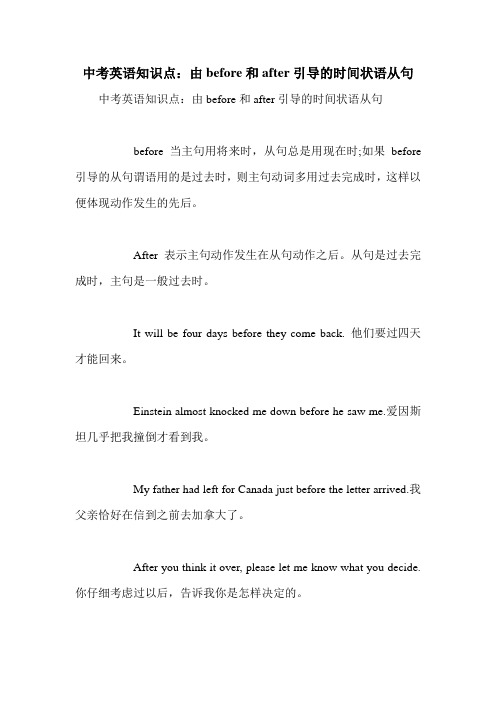before(时间状语从句)
before时间状语从句,主句用还是过去时

标题:深入探讨“before时间状语从句,主句用还是过去时”在中文语法中,时间状语从句是非常重要的一种句型,它可以在句子中表示出时间的先后关系。
而在英文中,before时间状语从句在句子中的使用也是相当常见且有特殊的用法。
在本篇文章中,我们将深入探讨before时间状语从句在主句中使用还是过去时的情况,希望通过对这一语法现象的深入分析,能够帮助读者更好地掌握这一知识点。
在正式开始探讨之前,让我们先来了解一下before时间状语从句的基本概念。
before时间状语从句表示的是“在……之前”,用来说明一个事件发生的时间点。
在英语中,当before引导的时间状语从句和主句表示的动作属于同一时间段,且主句中的动作发生在从句动作之前时,主句通常使用过去时态。
接下来,我们将通过具体的例句和分析来说明这一语法现象。
1. 当主句动作在时间上位于before时间状语从句动作之前时,我们通常使用过去时态。
例如:Before I went to bed, I checked all the doors.在我睡觉之前,我检查了所有的门。
2. 如果从句和主句的动作是在相同的时间周期内发生的,且主句动作发生在从句动作之前时,主句也需要使用过去时态。
例如:I read the book before I took the test.在我考试之前,我读了这本书。
3. 另外一个常见的情况是,当主句表示的动作是一种经常性或习惯性的动作,而从句表示的是一个具体的事件时,主句同样要使用过去时态。
例如:She always checked her em本人ls before she went to sleep.她睡觉之前总是查看她的电流新箱。
通过以上例句和分析,我们可以清楚地看到在英语中,before时间状语从句在主句中使用过去时态的情况。
这种语法现象在实际应用中非常常见,因此我们有必要对其进行深入的了解和掌握。
对于这一语法现象,个人的理解是,在使用before时间状语从句时,我们需要根据具体情况来决定主句动作是否要使用过去时态。
时间状语从句Before-After-Until-Since.doc

时间状语从句Before/After/Until/Since1、时间状语从句(二)由before和after引导的时间状语从句的区别用法▲before引导的从句不再用否定式的谓语,并且当before 引导的从句位于主句之后,有时译成“就,才”。
还要注意主句和从句之间的时间关系。
当主句用将来时,从句总是用现在时;如果before引导的从句谓语用的是过去时,则主句动词多用过去完成时,这样以便体现动作发生的先后。
如:It will be four days before they come back. (主将从现,一一对应)他们要过四天才能回来。
Einstein almost knocked me down before he saw me. (几乎同时发生)爱因斯坦几乎把我撞倒才看到我。
My father had left for Canada just before the letter arrived. (主过完从过)我父亲恰好在信到之前去加拿大了。
They hadnotbeen married four months before they were divorced.他们结婚还不到四个月就离婚了。
▲after表示主句动作发生在从句动作之后。
主句和从句的动作的时间关系正好与before引导的从句相反。
如:After you think it over, please let me know what you decide.你仔细考虑过以后,告诉我你是怎样决定的。
After we had finished the work, we went home.完成工作之后,我们回家了。
(从句用过去完成时,主句用一般过去时)(三)till或until引导的时间状语从句的区别till和until 一般情况下两者可以互换,但是在强调句型中多用until。
但要注意的是:①如果主句中的谓语动词是瞬时动词时,必须用否定形式;②如果主句中的谓语动词是延续性动词时,用肯定或否定形式都可以,但表达的意思不同。
before的时间状语从句

before的时间状语从句"Before"常常用作引导时间状语从句,用来表示在某个动作或事件发生之前的时间关系。
时间状语从句通常由连词引导,紧跟在主句之后,从句中的动作或事件发生在主句中的动作或事件之前。
例如,“Before I go to bed, I always brush my teeth.”(在我上床睡觉之前,我总是刷牙。
)在这个例句中,“Before I goto bed”就是一个时间状语从句,它说明了刷牙动作发生的时间。
在句子中,时间状语从句可以出现在主句之前或之后,具体位置取决于强调的重点。
如果时间状语从句出现在句首,通常需要用逗号与主句隔开,如,“Before the meeting starts, I need to prepare the documents.”(在会议开始之前,我需要准备文件。
)而如果时间状语从句出现在句尾,通常不需要逗号分隔,如,“I need to prepare the documents before the meeting starts.”。
另外,需要注意的是,当时间状语从句中的动作与主句中的动作同时发生时,通常要使用现在完成时态或者一般现在时态,以表示这种时间关系。
例如,“I will call you before I have finished my work.”(在我完成工作之前,我会给你打电话。
)这里的时间状语从句“before I have finished my work”和主句中的动作“will call”并不是严格的先后关系,而是同时发生的关系。
总的来说,“before”的时间状语从句能够帮助我们更清晰地表达动作或事件发生的时间关系,让句子的逻辑关系更加明确。
before(时间状语从句)

1. The elephant, big, go through the door The elephant is too big to go through the door. The elephant isn’t small enough to go through the door. 2.The girl, short, reach the apple. The girl is too short to reach the apple. The girl isn’t tall enough to reach the apple. 3. The cat runs, slowly, catch the mouse. The cat runs too slowly to catch the mouse. The cat doesn’t run fast enough to catch the mouse.
when, after, before(时间状语从句) (时间状语从句) 1.当他到过家里的时候,她稍微休息了一下。 当他到过家里的时候,她稍微休息了一下。 当他到过家里的时候 When she reached home, she had a short rest. 2.你做完作业才能离开。 你做完作业才能离开。 你做完作业才能离开 Don’t leave before you finish your homework. Don’t leave until you finish your homework. 3.你跟你父母亲谈了之后,请给我打个电话。 你跟你父母亲谈了之后,请给我打个电话。 你跟你父母亲谈了之后 Please give me a ring after you talk to your parents.
Lesson Ninety-two The Ninety-second Lesson
Before的详细用法总结

Before的详细用法总结今天给大家带来Before的用法,我们一起来学习吧,下面就和大家分享,来欣赏一下吧。
Before的用法我们最初接触的Before一般是作为介词使用的,一般表示空间上的“在…之前” 。
例如:The tea has been set before her.茶已经摆在她面前了。
Before作为介词时,需要注意的是,一般不用在表示具体时间的词之前。
比如,两年之前,我们用two years ago,而不能说.efore two years.Before作为介词时,有一个特殊用法需要注意,即before long 表示“不久之后”。
例如:Before long he got married.不久之后他就结婚了。
Before作为连词时,一般意为“在…之前”,用来引导时间状语从句。
引导的从句中的动作一般发生在主句动作之后。
Before作为连词时的用法较为复杂,具体要点如下:一、主句用一般现在时/一般将来时,从句用一般现在时。
例如:You should let me explain what I did before you criticize me.在你批评我之前,你应该让我解释一下我做过什么。
二、主句用过去完成时,从句用一般过去时。
一般翻译为“在…之前就… ”。
例如:1.His father had died before he was born.他父亲在他出生之前就已经去世了。
2.She had finished her homework before her mother returned.她在妈妈返回之前就已经把作业完成了。
三、主句用一般过去时,从句用过去完成时。
从句用过去完成时表示一个过去没有完成或没来得及做的、时间顺序在后的动作,常译为“★还没(来得及)…就…★ ”。
例如:1.He rushed out of the office before I had realized what was happening.我还没意识到发生了什么事,他就冲出去了。
before用法归纳

before用法知多少?在高考中,状语从句是每年高考单项填空部分必考的题目之一,考查的重点是考生容易混淆并且近似的连词在逻辑行文和语篇结构中的使用。
before作连词的用法一直是高考的重点,也是学生感觉掌握起来比较头疼的地方。
下面选取近几年各省市的高考试题进行归纳分析,使考生通过典型实例,把握高考对before所引导的句型的命题规律,帮助同学们更好地解答此类题目。
1. before作为连词时的基本意义是“在……之前”,用于表示时间或顺序。
You can’t borrow books from the school library ______ you get your student card. (2009上海,32)A. beforeB. ifC. whileD. as【解析】选A。
考查连词,该句的意思是:在你得到你的学生卡之前你不能从学校图书馆借书。
before表示先后顺序。
2. 表示“过了多久才……”,说明主句的持续时间比较长而从句的动作缓缓来迟。
(1) The American Civil War lasted four years _______ the North won in the end. (2005广东,30)A. afterB. beforeC. whenD. then【解析】选B。
本题考查连词before表示“在多久之后才……”的用法,根据本句含义“美国南北战争持续了四年,北方才最终取得胜利”,可知本题应选B。
(2) Several weeks had gone by I realized the painting was missing. (2004宁夏,39)A. asB. beforeC. sinceD. when【解析】选B。
before表示“过多久才……”。
句意:几个星期已经过去了,我才意识到油画丢了。
内含的意思是油画丢了好几个星期了,我才意识到。
3. 表示从句动作还没来得及发生或完成,主句动作就已经发生或完成了,意为“尚未……就”,“没来得及……就”,常用于before sb. can/ could…。
It-…+点时间段时间+before…诠释

It …+点时间/段时间+before…诠释高中英语中,before句式,相似性强,考生易混淆,究其用法,现小结于后,敬供商榷。
1. It was / will be + 段时间+ before …在“It was / will be + 段时间 + before 从句”结构中,before是从属连词,表示“……才;……就”,引导时间状语从句。
例:It was just 3 days before the book was published.三天后那本书就出版了。
例:It will be five years before we meet again.五年后我们才会在见面。
2. It wasn’t long before …/ It won’t long before …在“It wasn’t long before从句”结构中,before是从属连词,表示“不久以后就……”;而“It won’t long before从句”结构中,before是从属连词,意为“不久就会……”,引导时间状语从句。
例:It wasn’t long before he came home.他不久后才(很快)回到了家里。
例:It won’t long before you get well again.不久你就可以恢复健康了。
3. It be + 点时间+ before …在“It be +点时间 + before从句”结构中,before是从属连词,表示“在……之前;时间是……”,引导时间状语从句。
例:It was 4:00 before he came to see you.他是四点后来看你的。
4. It be + 点时间+ when …在“It be +点时间 + when从句”结构中,when是从属连词,表示“当时是……”,引导时间状语从句。
例:It was 4:00 when he came to see you.他来看你时,已是四点了。
中考英语知识点:由before和after引导的时间状语从句

中考英语知识点:由before和after引导的时间状语从句中考英语知识点:由before和after引导的时间状语从句
before当主句用将来时,从句总是用现在时;如果before 引导的从句谓语用的是过去时,则主句动词多用过去完成时,这样以便体现动作发生的先后。
After表示主句动作发生在从句动作之后。
从句是过去完成时,主句是一般过去时。
It will be four days before they come back. 他们要过四天才能回来。
Einstein almost knocked me down before he saw me.爱因斯坦几乎把我撞倒才看到我。
My father had left for Canada just before the letter arrived.我父亲恰好在信到之前去加拿大了。
After you think it over, please let me know what you decide.你仔细考虑过以后,告诉我你是怎样决定的。
After we had finished the work, we went home.完成工作之后,我们回家了。
(从句用过去完成时,主句用一般过去时)。
- 1、下载文档前请自行甄别文档内容的完整性,平台不提供额外的编辑、内容补充、找答案等附加服务。
- 2、"仅部分预览"的文档,不可在线预览部分如存在完整性等问题,可反馈申请退款(可完整预览的文档不适用该条件!)。
- 3、如文档侵犯您的权益,请联系客服反馈,我们会尽快为您处理(人工客服工作时间:9:00-18:30)。
If (条件状语从句) 1. 如果他来了,我会告诉你。 I’ll tell you if he comes. If he comes, I’ll tell you. 2.如果明天我有空,我就跟你一起去。 If I’m free tomorrow, I’ll go with you. I’ll go with you if I’m free tomorrow. 3.如果明天不下雨,我就到那里去。 If it doesn’t rain tomorrow, I’ll go there. I’ll go there if it doesn’t rain tomorrow.
when, after, before(时间状语从句) 1.当他到过家里的时候,她稍微休息了一下。 When she reached home, she had a short rest. 2.你做完作业才能离开。 Don’t leave before you finish your homework. Don’t leave until you finish your homework. 3.你跟你父母亲谈了之后,请给我打个电话。 Please give me a ring after you talk to your parents.
Lesson Ninety-two The Ninety 1. Where is Kate?
She is in bed.
2. What’s wrong with Kate? Her head hurts.
3. Can she eat anything before she goes to see the doctor? No, she mustn’t.
1. Mary called Tom at four thirty this afternoon. Who called Tom at four thirty this afternoon? 2.He is using Li Mei’s knife. Whose knife is he using? 3. She worked at the hospital for ten hours yesterday. How long did she work at the hospital yesterday? 4. He comes from France. Where does he come from? 5.They had their meeting in Room 302. Where did they have their meeting? 6.He got up at six this morning. What time did he get up this morning?
1. The elephant, big, go through the door The elephant is too big to go through the door. The elephant isn’t small enough to go through the door. 2.The girl, short, reach the apple. The girl is too short to reach the apple. The girl isn’t tall enough to reach the apple. 3. The cat runs, slowly, catch the mouse. The cat runs too slowly to catch the mouse. The cat doesn’t run fast enough to catch the mouse.
1.不要嘲笑别人,好吗? Don’t laugh at other people, will you? 2.两天后,我们终于到达了那个小镇。 Two days later we reached that small town at last. 3.我们花了两个多小时才完成那项工作。 It took us more than two hours to finish the work. 4.你要花多长时间才能看完这本书? How long will it take you to finish reading that book? 5.你千万不要这么早离开。 You mustn’t leave so early. 6. 我现在感觉更好些了。 I feel a little better now.
